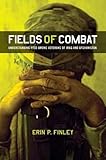Fields of combat : understanding PTSD among veterans of Iraq and Afghanistan / Erin P. Finley.
Material type: TextSeries: Publication details: Ithaca : ILR Press, (c)2011.Description: 1 online resource (xiii, 221 pages)Content type:
TextSeries: Publication details: Ithaca : ILR Press, (c)2011.Description: 1 online resource (xiii, 221 pages)Content type: - text
- computer
- online resource
- 9780801460708
- RC552 .F545 2011
- COPYRIGHT NOT covered - Click this link to request copyright permission: https://lib.ciu.edu/copyright-request-form
| Item type | Current library | Collection | Call number | URL | Status | Date due | Barcode | |
|---|---|---|---|---|---|---|---|---|
 Online Book (LOGIN USING YOUR MY CIU LOGIN AND PASSWORD)
Online Book (LOGIN USING YOUR MY CIU LOGIN AND PASSWORD)
|
G. Allen Fleece Library ONLINE | Non-fiction | RC552.67 (Browse shelf(Opens below)) | Link to resource | Available | ocn732959290 |
Includes bibliographies and index.
Fourth of July: a tradition of service in San Antonio -- War stories: case studies of combat deployment -- Home again: early experiences of post-deployment stress -- Of men and messages: how everyday cultural influences affect living with PTSD -- Clinical histories: from soldier's heart to PTSD -- Under pressure: military socialization and stigma -- Embattled: the politics of PTSD in VA mental health care -- Navigation: identity and social relations in treatment seeking and recovery.
In this book the author relates the stories of how American veterans and their families navigate the return home. For many of the 1.6 million U.S. service members who have served in Iraq and Afghanistan since 2001, the trip home is only the beginning of a longer journey. Many undergo an awkward period of readjustment to civilian life after long deployments. Some veterans may find themselves drinking too much, unable to sleep or waking from unspeakable dreams, lashing out at friends and loved ones. Over time, some will struggle so profoundly that they eventually are diagnosed with post-traumatic stress Disorder (PTSD). Following a group of veterans and their personal stories of war, trauma, and recovery, the author illustrates the devastating impact PTSD can have on veterans and their families, their loved ones, and their communities. He explores issues of substance abuse, failed relationships, domestic violence, and even suicide and also challenges popular ideas of PTSD as incurable and permanently debilitating. Drawing on ethnographic material, he examines the cultural, political, and historical influences that shape individual experiences of PTSD and how its sufferers are perceived by the military, medical personnel, and society at large. Despite widespread media coverage and public controversy over the military's response to wounded and traumatized service members, debate continues over how best to provide treatment and compensation for service-related disabilities. Meanwhile, new and highly effective treatments are revolutionizing how the Department of Veterans Affairs (VA) provides trauma care, redefining the way PTSD itself is understood in the process. Untangling each of these conflicts, the book reveals the very real implications they have for veterans living with PTSD and offers recommendations to improve how we care for this vulnerable but resilient population. --
COPYRIGHT NOT covered - Click this link to request copyright permission:
There are no comments on this title.
